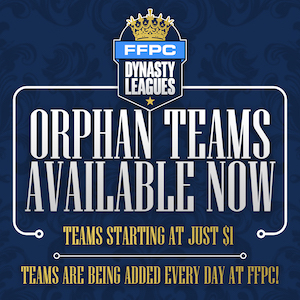Cleveland Browns wide receiver Odell Beckham Jr didn't provide the top-tier fantasy football production in 2019 that owners were expecting. Jake Trowbridge evaluates how his injury, target share, and other factors played into his underwhelming finish, and what it means for 2020.
"What Went Wrong?" is a Rotoballer offseason series exploring fantasy players who underperformed their ADP. We'll explain why they fell below expectations and try to determine what it means for their value going forward.
Finally free from the decrepit arm of Eli Manning and away from the torturous New York media, Odell Beckham Jr was expected to thrive his first year in Cleveland. With a young, fearless quarterback at the helm, fantasy owners dreamed of nothing but 50-yard bombs from Baker Mayfield taken to the house by a smiling, high-stepping Beckham.
His top-tier ADP of WR4 came with a willingness to forget his injury history, which to that point had caused him to miss more than a quarter of his career games. And yet, despite playing all 16 games for only the second time in his career, Beckham finished at a meager WR25 on the season. He finished as a top-12 WR only two weeks and only twice more was he in the top 24. That, by any definition, qualifies as a bust. So what went wrong?
Featured Promo: Looking for some more fantasy football action? Adopt a dynasty orphan team over at FFPC. Sign up today and get $25 off any FFPC league. Sign Up Now!
The Simple Stats
- Cleveland had 539 passing attempts in 2019 (19th in the NFL). This dropped from 574 in 2018 (12th).
- The Giants had 583 passing attempts in 2018 (10th).
- Cleveland threw the ball 55.4% of the time in 2019, compared to 56.1% in 2018.
- The Giants threw the ball 59.2% of the time in 2018.
- Beckham's receptions per game dropped to 4.6 in 2019, compared to 6.4 in 2018, and his career average of 6.2.
- Beckham posted more than 1,000 yards for the fifth time in his career (1,035).
- Beckham averaged 64.7 receiving yards per game in 2019 (32nd among WRs), compared to 87.7 in 2018 (9th), and his career average of 86.8.
Transition To a New Team
Since 2009, excluding players who were traded midseason, there have been 13 wide receivers who have switched teams in the offseason and have played at least 13 games in each of those consecutive seasons. On average, those receivers' stats dropped by nine receptions, 99 yards, and two TD with their new team. Most importantly, their end-of-year fantasy finish dropped by 10 spots.
So we should have expected a bump down for Beckham in his first year with Cleveland. And he mimicked that narrative perfectly. Even though he played four more games in 2019 than he did in 2018, he dropped from WR15 to WR25 overall. On a points-per-game basis, it was a more drastic drop from WR7 to WR33.
The common thought was that since Baker Mayfield is a better and more opportunistic quarterback than Eli Manning at this stage in his career, it would be a significant upgrade for Beckham. Mayfield represented strength and moxie, whereas Manning was the poster boy for fragility. Therefore, there would be more opportunities for Beckham, and those opportunities would be more valuable. Win-win, right?
2018 vs 2019
Not so much. Fantasy owners overlooked the impact Jarvis Landry would have on Beckham's target share. Landry had an extravagant 25.96% target share in 2018 as the top receiving option on the Browns. With OBJ incoming, that number was expected to take a nosedive. Instead, it stayed nearly the same at 25.6%.
To be fair, Beckham commanded a healthy target share himself, eating up 24.7% of the Browns' total receiving pie. But that was still a notable decrease from his 28.3% target share in 2018 with the Giants. In fact, this was the second-lowest target share of his career.
Here's where things really start to go off the rails. He had just six games where he reached double-digit targets this year, compared to eight last year. Meanwhile, Beckham had nine games with fewer than nine targets this year, compared to just one last year. And again, he played four more games in 2019 than in 2018.
Worse, he had just two games with 100+ receiving yards. Even worse still, 25% of his yardage and touchdowns came in just two games. Because of all that, Beckham finished as a WR2 or better in just four games, and all of those came against bottom half passing defenses.
But there's another reason for Beckham's statistical downturn.
The Core Muscle Injury
Although he didn't miss any games, OBJ dealt with a core muscle injury throughout the season. Beckham suffered the injury in training camp, and it affected his play for the rest of the year.
For context, DeSean Jackson suffered a major core muscle injury in Week 2 season and subsequently missed the next six games. When he tried to return to play against the Bears in Week 9, he managed just four snaps and suffered a setback that sidelined him the rest of the season. Though, to be fair, Jackson's injury was significantly worse, as he actually tore his abdominal muscle off the bone. Beckham's injury wasn't to the same extent, but the comparison paints an important picture of how tough these injuries can be on a player.
Baker Mayfield commented that Beckham's injury situation "wasn't handled right," noting he was "not able to run as well as he should be able to." Mayfield said he could sense his teammate's frustration with it throughout the season. Beckham underwent surgery in January to repair it, so it hopefully shouldn't affect him next year.
But there were also outside factors that led to his down year.
Significant Changes To the Offense
Most are going to point to Kitchens' poor coaching job as the culprit for why Mayfield and his cohorts put up poor fantasy showings. But what's strange is Kitchens was actually credited for improving Mayfield's play in his rookie year after taking over from Hue Jackson halfway through the season. Mayfield ranked as the QB22 in fantasy while playing with Jackson, but jumped to QB10 once Kitchens took the reins.
In that stretch, Mayfield averaged 33 attempts, 286 yards and 2.4 touchdowns per game, with a 104.3 passer rating. Unfortunately, Kitchens couldn't help sustain those numbers in 2019. Despite still averaging 33 attempts per game, the TD average dropped to 1.4, the yards to 222, and Mayfield's passer rating plunged to 76.1.
How much of that was on Kitchens? And how much was due to shipping guard Kevin Zeitler to New York in the Beckham trade? After all, Cleveland had the 2nd-ranked offensive line according to PFF at the end of the 2018 season. Fast forward to the end of 2019, and PFF had them ranked 23rd.
The Browns' pass protection issues can't be overstated, as his protection rate (77.6%) ranked 30th among quarterbacks. Last year that rate (84.9%) ranked 11th. That's a large reason Mayfield didn't throw the ball as frequently as he did his rookie year, and why so many of his passes looked -- to put it as nicely as possible -- "off."
How Will It Go In 2020?
Even though Beckham will technically be involved in a "new" offense, as new head coach Kevin Stefanski and new offensive coordinator Alex Van Pelt will retool the Browns offense.
Stefanski was the OC in Minnesota last year -- his only year in that position -- and produced a passing offense that ranked 30th in attempts, 23rd in yards and 14th in touchdowns. It yielded a WR26 finish for Stefon Diggs, and a WR44 finish for Adam Thielen on a points-per-game basis. For comparison, they finished WR11 and WR7, respectively, the previous year. It's a very limited sample size, but certainly one worth factoring into the overall picture.
Van Pelt was the QB coach in Green Bay from 2014-2017, and in Cincinnati from 2018-2019. While he had it easy with Aaron Rodgers, the Bengals passing offense was mediocre at best (and disastrous at worst) in those two years. Though when your quarterbacks are Andy Dalton, Jeff Driskel, and Ryan Finley, that's to be expected. His report card isn't necessarily predictive of how he'll impact this new offense.
The days of Odell Beckham Jr. being viewed as a top-five player at his position are gone. But a top-10 finish isn't completely out of reach for the talented receiver going into his age-27 season. If he can stay healthy, acclimate to the new coaching staff, continue building on his connection with Baker, and procure a large enough percentage of Stefanski's presumably modest passing attack, he can get back near the elite tier of receivers. A lot of things will have to go right, but there's room for him to re-ascend into the WR1 ranks.
More Fantasy Football Analysis





 RADIO
RADIO

























